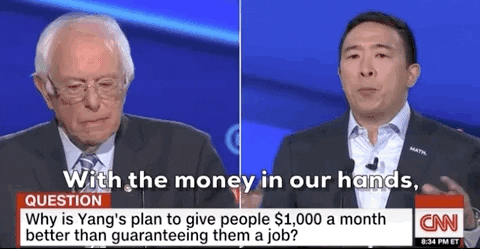A Large-Scale Test Of Basic Income Led To This Surprising Conclusion
Lump sum or monthly payments ... which is more helpful? Giphy
Giphy
News that is entertaining to read
Subscribe for free to get more stories like this directly to your inboxWhile local governments across the U.S. and around the world have been flirting with the notion of “universal basic income” for years, there’s no real consensus regarding the most effective way to distribute money to large populations.
Nevertheless, the emerging evidence suggests that people can and do benefit from such payments — and they don’t turn into leeches who refuse to work, as some UBI critics might have expected.
Lump sum vs. monthly payments
It’s a conundrum you might have considered if you’ve ever bought a lottery ticket. Should you go for the lump sum payment or receive your winnings spaced out in payments over a period of years?
While you’ll probably never have an opportunity to answer that question, thousands of people living in rural Kenya have been engaged in a significantly more modest version since 2016.
A charity known as GiveDirectly has been handing out $20 monthly payments to thousands of individuals, but other folks have received an upfront sum equal to about two years worth of monthly handouts. And now the first wave of evidence is starting to emerge.
Identifying the pros and cons
There are significant advantages and disadvantages related to each approach, but one strategy — the lump sum payment — came out as the clear winner. An informal paper published by researchers found that those in this group:
- Earned more money
- Received more education
- Launched more businesses
But that doesn’t mean there aren’t advantages to the monthly payments, which can help recipients create a budget and pay for recurring expenses. And like the lottery example, this long-term experiment suggests asking the individuals whether they would prefer to receive one large payment or monthly smaller ones.
The lesson seems to be that money, while it won’t buy happiness, can really help struggling people meet their everyday needs.
 Why Is The Aging Voyager 1 Probe Sending Back Incoherent Communications?
It's been speaking gibberish for a few months and officials are concerned.
Why Is The Aging Voyager 1 Probe Sending Back Incoherent Communications?
It's been speaking gibberish for a few months and officials are concerned. One Woman’s Massive Donation Is Wiping Out Tuition At This Medical School
Her inheritance came with the instruction to do "whatever you think is right."
One Woman’s Massive Donation Is Wiping Out Tuition At This Medical School
Her inheritance came with the instruction to do "whatever you think is right." Woman’s Pets Will Inherit Her Multimillion-Dollar Fortune, Not Her Kids
It's not the first time four-legged heirs were named in a will.
Woman’s Pets Will Inherit Her Multimillion-Dollar Fortune, Not Her Kids
It's not the first time four-legged heirs were named in a will.